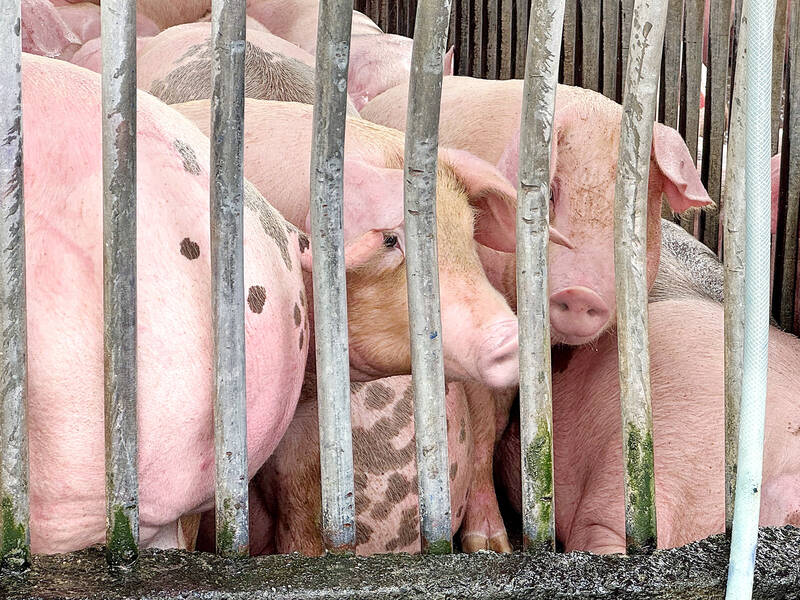The Ministry of Agriculture yesterday issued a five-day nationwide ban on transporting and slaughtering pigs after African swine fever was confirmed at a hog farm in Taichung’s Wuci District (梧棲) on Tuesday evening.
The detection means Taiwan has lost its status as the only Asian country free of classical swine fever (CSF), African swine fever and foot-and-mouth disease.
Authorities pre-emptively culled 195 pigs at the farm at about 3am, disinfected the entire site to prevent the disease from spreading and set up a 3km-radius control zone restricting movement around the affected area, the ministry told a news conference.

Photo: CNA
It said it is monitoring the health of all pigs in the area and investigating the source of the infection.
The ministry reviewed transport routes and all 33 farms associated with the suspected farm and found no abnormalities, it said.
An emergency response center was yesterday set up on-site in Taichung, Minister of Agriculture Chen Junne-jih (陳駿季) said.
Starting from noon, transporting and slaughtering pigs are suspended nationwide for at least five days, pending changes, while feeding pigs with kitchen waste is also prohibited, Chen said, adding that Taiwan would temporarily halt the export of pork products.
All meat markets and vehicles used to transport hogs would be thoroughly cleaned and disinfected, he said.
Pigs that were transported before the suspension would still be allowed to enter meat markets and slaughterhouses, but cannot leave, Chen added.
President William Lai (賴清德) yesterday wrote on Facebook that he has asked the Executive Yuan to apply the strictest standards in implementing government disease-prevention measures.
People do not need to panic, as African swine fever cannot be transmitted from animals to humans, he added.
The Central Emergency Operations Center for African Swine Fever said the virus takes a long time to completely disappear.
Not only is it highly contagious, but it can survive for about 100 days in refrigerated pork, up to 1,000 days in frozen pork and one month inside pigpens, the center said.
Taiwan in May became the first country in Asia to be officially free of CSF, African swine fever and foot-and-mouth disease when the World Organisation for Animal Health certified its CSF-free status.
African swine fever has stricken many countries globally and swept across Asia since 2018, but Taiwan had effectively blocked the virus at its borders and was declared free of African swine fever in October last year.
Pork is a staple in Taiwanese cuisine, while the pork industry is a central part of the nation’s agricultural industry. Over the years, Taiwan has implemented stringent control measures to safeguard its pork industry, which generates about NT$70 billion (US$2.3 billion) annually.
Additional reporting by Esme Yeh and CNA

‘WIN-WIN’: The Philippines, and central and eastern European countries are important potential drone cooperation partners, Minister of Foreign Affairs Lin Chia-lung said Minister of Foreign Affairs Lin Chia-lung (林佳龍) in an interview published yesterday confirmed that there are joint ventures between Taiwan and Poland in the drone industry. Lin made the remark in an exclusive interview with the Chinese-language Liberty Times (the Taipei Times’ sister paper). The government-backed Taiwan Excellence Drone International Business Opportunities Alliance and the Polish Chamber of Unmanned Systems on Wednesday last week signed a memorandum of understanding in Poland to develop a “non-China” supply chain for drones and work together on key technologies. Asked if Taiwan prioritized Poland among central and eastern European countries in drone collaboration, Lin

The Chien Feng IV (勁蜂, Mighty Hornet) loitering munition is on track to enter flight tests next month in connection with potential adoption by Taiwanese and US armed forces, a government source said yesterday. The kamikaze drone, which boasts a range of 1,000km, debuted at the Taipei Aerospace and Defense Technology Exhibition in September, the official said on condition of anonymity. The Chungshan Institute of Science and Technology and US-based Kratos Defense jointly developed the platform by leveraging the engine and airframe of the latter’s MQM-178 Firejet target drone, they said. The uncrewed aerial vehicle is designed to utilize an artificial intelligence computer

Renewed border fighting between Thailand and Cambodia showed no signs of abating yesterday, leaving hundreds of thousands of displaced people in both countries living in strained conditions as more flooded into temporary shelters. Reporters on the Thai side of the border heard sounds of outgoing, indirect fire yesterday. About 400,000 people have been evacuated from affected areas in Thailand and about 700 schools closed while fighting was ongoing in four border provinces, said Thai Rear Admiral Surasant Kongsiri, a spokesman for the military. Cambodia evacuated more than 127,000 villagers and closed hundreds of schools, the Thai Ministry of Defense said. Thailand’s military announced that

CABINET APPROVAL: People seeking assisted reproduction must be assessed to determine whether they would be adequate parents, the planned changes say Proposed amendments to the Assisted Reproduction Act (人工生殖法) advanced yesterday by the Executive Yuan would grant married lesbian couples and single women access to legal assisted reproductive services. The proposed revisions are “based on the fundamental principle of respecting women’s reproductive autonomy,” Cabinet spokesperson Michelle Lee (李慧芝) quoted Vice Premier Cheng Li-chiun (鄭麗君), who presided over a Cabinet meeting earlier yesterday, as saying at the briefing. The draft amendment would be submitted to the legislature for review. The Ministry of Health and Welfare, which proposed the amendments, said that experts on children’s rights, gender equality, law and medicine attended cross-disciplinary meetings, adding that